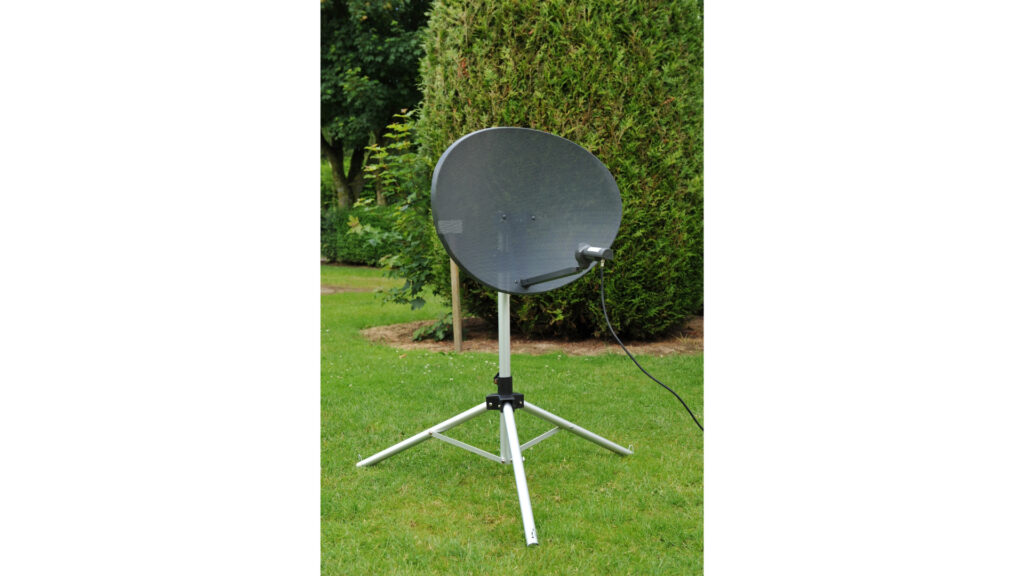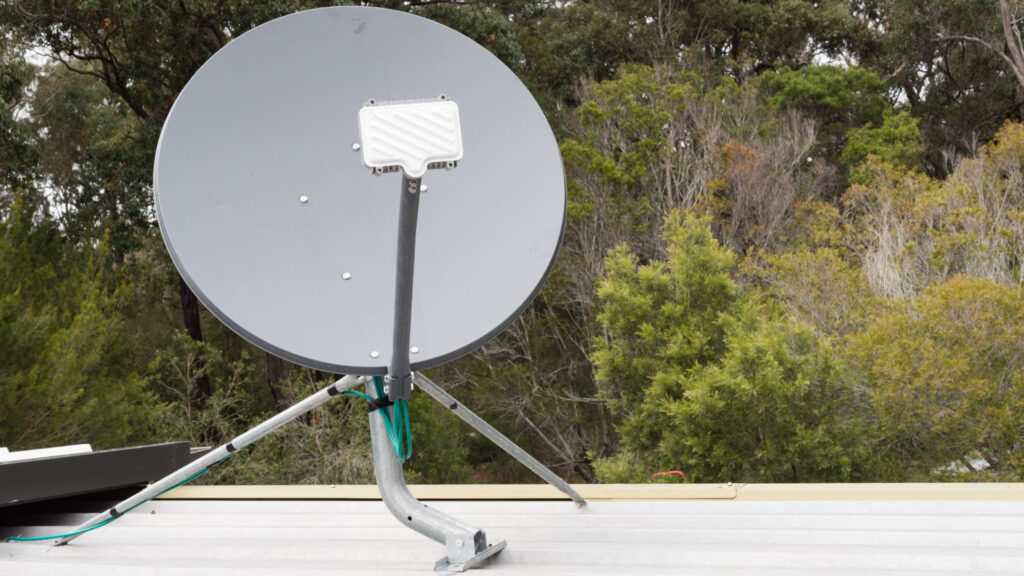Table of Contents Show
You might have heard of Tesla, SpaceX, and Elon Musk, but have you heard of satellite internet? The option for satellite internet for RVers is exciting. However, SpaceX’s satellite internet program, Starlink, is still in its developmental stages and isn’t ready for widespread use.
Let’s look more closely at satellite internet for RVs — what it looks like now and what it might look like in the future.
What Is Satellite Internet for an RV?
Satellite internet doesn’t use cell towers or cables to provide internet. This new technology uses satellites to send internet signals, meaning you can connect from virtually anywhere. There is no need for hard wiring under the ground or tall cell towers at every corner.
This is a new possibility still in developmental stages, but the future is encouraging. Currently, RVers can’t access reliable, widespread internet. Just give it some time, and almost every RVer may want to sign up for it.
Pro Tip: Are you curious about connecting your RV to the internet without a satellite? We have some other options for you to check out, click here!
Pros and Cons of Satellite Internet for Your RV
As we look to the future of how satellite internet will work for RVers, it’s exciting. If cable, fiber, or phone lines don’t exist in your area, satellite internet may be the only option. And as it continues to grow and develop, it may end up being the best solution for RVers, especially ones who like to travel off-grid.
You can access it from remote locations as it bounces signals off satellites in space rather than needing towers or hard lines. And you’ll less likely get disconnected after a natural disaster. If you do lose signal, it will recover quickly.

One con right now is that satellite internet for RV use is not reliable. Some spots have great internet, but it’s not widespread yet. Your campsite must be completely unobstructed to receive the reliable service needed to stream, download, video chat, and work online.
Many people prefer to stay at specific campgrounds in wooded areas surrounded by nature. This poses a problem for satellite internet for RV use. You’ll need direct access to the satellite from the roof of your RV or tripod at your campsite to receive quality service.
Other cons include slower speeds, data caps, expensive monthly bills, and latency issues. But since its inception twenty years ago, satellite internet has come a long way and will continue to improve.
What Type of Satellite Internet Is Best for Your RV
So if you want satellite internet, what hardware options do you have? Let’s take a look at an outdoor tripod, a roof-mounted dish, and a router-style receiver box and examine the pros and cons of each.
Tripod
You can set up a tripod outside your RV in your campsite. If stationary, you can bolt it to a structure. The tripod holds the satellite dish and secures it on the ground. Tripods protect the satellite from water, mud, and debris by keeping it off the ground. This portable option helps when looking for a prime location to receive a signal.
One con of using a tripod is you may camp somewhere that doesn’t have flat, level ground. Thus, using a tripod is almost impossible. For example, if you’re camping on the side of a mountain, you probably won’t find a good spot to set up your tripod.
You also have to have an unobstructed view of the sky. Although tripods are portable, if trees surround you, the satellite dish is pretty much useless on the tripod.

Roof-Mounted
You could also mount a satellite dish on the roof of your RV. This option might be a little safer than the tripod because you don’t run the risk of knocking it over. Plus, you don’t have to set it up when you arrive at a campsite because it’s already mounted and ready to go.
However, it isn’t portable. So if you don’t get a good signal, you’re out of luck. And just like a satellite set up on a tripod, you still need an unobstructed view of the sky. With campgrounds at almost full capacity, the likelihood of you moving your motorhome to another site away from trees is slim.

Router-Style Receiver Box
You’ll need a receiver box inside your RV to translate the data from the satellite to your device. An ethernet cable connects directly from a modem to a laptop. If you want satellite internet for your RV, you’ll need to consider how you’ll use it.
If you use a tablet or mobile device instead of a laptop, you can’t use an ethernet cable. You’ll need a router to connect the modem to your devices. A router provides the wireless internet signal.
A con of using a router and modem set-up is the space it takes up. You’re already living in a tiny area, so adding more hardware means finding a place to put it. More hardware also means more equipment that can malfunction.

What Are the Best Satellite Internet Providers?
HughesNet, Viasat, and Starlink are the three leading satellite internet providers. HughesNet starts around $60 per month at download speeds of 25 Mbps. It’s available nationwide and best for rural areas that don’t have access to other internet options.
Viasat’s Unlimited Platinum plan gives the user 300 GB per month, costs about $200 per month, and downloads up to 100 Mbps. Again, not the best choice for urban or suburban areas with access to cable, fiber, and phone lines, but it works well for rural communities. These two satellite internet providers are primarily dedicated to residential areas and not for RV use.
Starlink
Starlink is only available in certain areas right now. It has created a buzz with its new satellite internet developments. Unfortunately, there is a long waitlist, but if you’re interested, sign up now. The upfront equipment costs around $500, but you can receive unlimited data for about $100 per month.
HughesNet and Viasat don’t offer unlimited plans. Because Starlink is still in beta test form, you may experience outages and interruptions periodically. Currently, the company has almost 2,000 private satellites in orbit, serving tens of thousands of customers.
What Are the Alternatives to Satellite Internet While on the Road?
So if satellite internet for RV use isn’t quite there yet, what are other options? If you need to work on the road or if your kids want to stream shows or play on their devices, you’ll need to figure out the best internet option for your lifestyle. Here are a few options.
Cell Phone Mobile Hotspot
You can use your cell phone mobile hotspot instead. Turn on the mobile hotspot feature and then connect your devices to your cell phone. This alternative works well in good cell service areas but won’t work well if your phone can’t receive a good signal. You can use the app Campendium to check out cell phone service at campgrounds all over the country.
Also, you might have data caps for hotspot use, so you’ll want to keep an eye on your plan limits. You may have unlimited data on your cell phone plan, but your mobile hotspot feature may only have 15GB of data per month.
Dedicated Mobile Hotspot
If you only have 15GB of hotspot data allowed per month on your cell phone plan, you may run out of that quickly if you use the internet regularly. Having a dedicated mobile hotspot with a separate data plan may work better. Especially if you work full-time and need reliable internet, having a mobile hotspot can provide that connectivity.
Again, your connection and service will vary from place to place, and using apps like Campendium will help you plan accordingly. But mobile hotspots can provide a high amount of data per month at pretty good speeds depending on your location.
Campground or Public Wi-Fi
A final option if you don’t use satellite internet for your RV is the campground Wi-Fi. This is the least reliable option. Because everyone at the campground will try to connect to the free Wi-Fi, the connection may be too slow.
The campground internet often gets overloaded, which means you probably can’t stream your favorite television series. Don’t count on public Wi-Fi if you need reliable internet.

Is Satellite Internet for Your RV Worth It?
Satellite internet for your RV could be worth it. The future is promising. Starlink is making great strides in its development. If you’re interested in satellite internet for your RV, get on their waitlist. But don’t expect to receive immediate internet service.
If you need something reliable now, go to Verizon, T-Mobile, or AT&T and check out their data plans for mobile hotspots. Or, look at upgrading your current cell phone plan. The future looks bright for satellite internet for RV use. How interested are you in joining the Starlink community?






